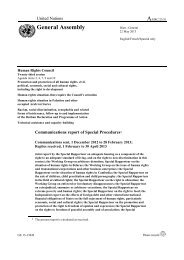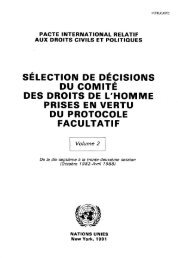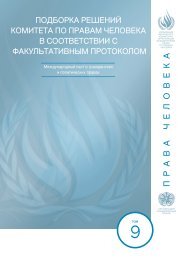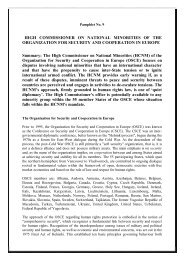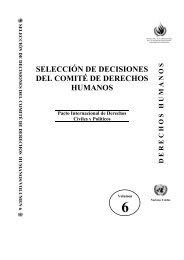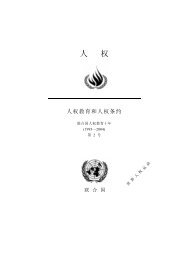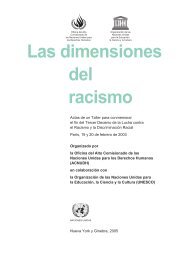good governance practices for the protection of human rights
good governance practices for the protection of human rights
good governance practices for the protection of human rights
Create successful ePaper yourself
Turn your PDF publications into a flip-book with our unique Google optimized e-Paper software.
cause <strong>of</strong> <strong>the</strong> shortage <strong>of</strong> such services and <strong>the</strong> urgency <strong>of</strong> <strong>the</strong> patients’ needs. For<br />
example, <strong>the</strong> Foundation’s 2003 survey showed that <strong>the</strong> most frequent reason<br />
cited by patients <strong>for</strong> bribing was to avoid long waiting lists <strong>for</strong> surgery and to<br />
obtain a sickness certificate.<br />
The first government regulation on <strong>the</strong> management <strong>of</strong> waiting lists was adopted<br />
in 1998. It obliged hospitals to keep “waiting lists” and to register patients who<br />
qualified <strong>for</strong> <strong>the</strong>rapy, but could not be admitted immediately. However, <strong>the</strong> regulation<br />
did not establish rules <strong>for</strong> <strong>the</strong> management <strong>of</strong> lists. Responding to <strong>the</strong> need<br />
<strong>for</strong> greater transparency, <strong>the</strong> Task Force launched <strong>the</strong> pilot project “waiting lists<br />
<strong>for</strong> surgery,” which attempted to establish <strong>of</strong>ficial lists in cardiology departments.<br />
In 2002, <strong>the</strong> Task Force conducted and published a review <strong>of</strong> international practice<br />
in <strong>the</strong> management <strong>of</strong> specialized medical services and waiting lists. It also<br />
sent a questionnaire to 120 cardiology wards asking about <strong>the</strong>ir current <strong>practices</strong><br />
regarding waiting lists. About 40 per cent <strong>of</strong> clinics responded and 70 per cent<br />
<strong>of</strong> those stated that <strong>the</strong>y maintained <strong>of</strong>ficial waiting lists. A majority, 68 per cent,<br />
stated that lists were based on clear medical criteria, but only 23 per cent said<br />
that <strong>the</strong>se criteria were public and available to patients.<br />
The Task Force also increased dialogue with <strong>the</strong> Ministry <strong>of</strong> Health to contribute<br />
to <strong>the</strong> Government’s discussions on <strong>the</strong> amendment <strong>of</strong> <strong>the</strong> Health Management<br />
Organizations Act. Specifically, <strong>the</strong> Task Force proposed that <strong>the</strong> Act should lay<br />
down clear criteria <strong>for</strong> waiting lists, ensure <strong>the</strong> public’s right to access in<strong>for</strong>mation,<br />
and provide <strong>for</strong> citizen supervision <strong>of</strong> waiting times.<br />
In 2003, <strong>the</strong> Ministry established an advisory unit <strong>of</strong> experts, including members<br />
<strong>of</strong> <strong>the</strong> Task Force, to work on a system to administer <strong>the</strong> lists <strong>of</strong> patients waiting<br />
<strong>for</strong> specialized medical services. In 2004, <strong>the</strong> Task Force developed draft regulations<br />
regarding publicly available waiting lists <strong>for</strong> <strong>the</strong> rationed medical services,<br />
which were included in <strong>the</strong> Act on Health Care Institutions adopted by parliament.<br />
As a result <strong>of</strong> <strong>the</strong> legislative changes, providers funded by <strong>the</strong> National<br />
Health Fund are required to set up a register <strong>of</strong> waiting patients and to adopt<br />
transparent criteria <strong>for</strong> <strong>the</strong>ir management.<br />
Impact on <strong>human</strong> <strong>rights</strong> and challenges<br />
The work <strong>of</strong> <strong>the</strong> Task Force has raised public awareness about <strong>the</strong> detrimental<br />
consequences <strong>of</strong> bribery in <strong>the</strong> delivery <strong>of</strong> health services. It has also sparked<br />
debate within <strong>the</strong> medical community and is largely responsible <strong>for</strong> <strong>the</strong> Government<br />
adopting clear criteria <strong>for</strong> <strong>the</strong> management <strong>of</strong> waiting lists.<br />
The Task Force has continued its work and has developed a checklist to assess<br />
draft legislative changes in health-care laws in terms <strong>of</strong> <strong>the</strong>ir implications <strong>for</strong> corrupt<br />
<strong>practices</strong>. It also identified <strong>the</strong> areas in <strong>the</strong> government draft bill on publicly<br />
financed health care which might lead to corrupt <strong>practices</strong>. In 2005, <strong>the</strong> Task<br />
Force developed best procedures <strong>for</strong> filling managerial positions in <strong>the</strong> health<br />
service, especially <strong>the</strong> positions <strong>of</strong> heads <strong>of</strong> wards in clinics and hospitals. It is<br />
also developing criteria <strong>for</strong> fairly evaluating candidates <strong>for</strong> such posts.<br />
70



